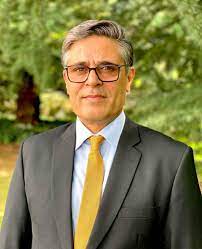Pakistan, China committed to cooperation on sustainable development of rivers: Ambassador Hashmi

Beijing: Pakistan and China are committed to cooperation for sustainable development and preservation of their rivers.
In this regard, the two countries signed a cooperation agreement focusing on the Indus and Yangtze rivers to explore the challenges and opportunities faced by river cultures, ecosystems and economies and engage in discussions on sustainable development of major rivers, Pakistan Ambassador to China, Khalil Hashmi said on Saturday.
“Both countries have learnt from the historic role that all these rivers and river system have played for the civilization, human settlements and cultures,” he said while talking to APP on the sidelines of the Yangtze Culture Forum held in Nanjing, China.
The forum brought together guests from all over the world to discuss and promote the shared values of humanity and establish a global network for dialogue and collaboration among major river cities.
Ambassador Hashmi acknowledged theme of the forum that focused on Yangtze River and its connections with humanity, cities and civilizations.
“As the largest river in China, Yangtze has played a significant role in economic and cultural development of several big cities along it,” he added.
“There are a number of ports along the Yangtze River and China has significantly preserved and used this river for not only development of human life but also for food security and connectivity.”
“Pakistan has also launched a big project called Living Indus Initiative that mainly deals with environmental protection and climate change,” he informed.
The forum, jointly hosted by UNESCO and other partners, fostered exchange and mutual learning in river basin areas, eventually constructing a shared human destiny community.
Rivers play a vital role in nurturing cities and preserving their cultural heritage and shared memories. Nanjing, the only one of China’s four great ancient capitals located along the Yangtze River, has been continuously paying attention to the Yangtze River issue for many years.
The uniqueness and innovation of this forum lie in establishing a platform to showcase and share the diverse cultures of the entire Yangtze River basin, with a broader goal to foster mutual learning and exchange among civilizations and cities of great rivers.
The forum focused on the theme “Flowing Rivers, Converging Future”. It discussed issues that are common in river basins globally.
The topics included ecological conservation, economic development, and the preservation and recording of culture. The forum was a platform for sharing wisdom about civilization and the future and addressed the mutual shaping of cities and rivers.





